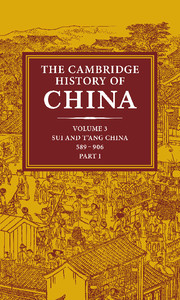Book contents
- Frontmatter
- 1 Introduction
- 2 The Sui dynasty (581–617)
- 3 The founding of the T'ang dynasty: Kao-tsu (reign 618–26)
- 4 T'ai-tsung (reign 626–49) the consolidator
- 5 Kao-tsung (reign 649–83) and the empress Wu: the inheritor and the usurper
- 6 The reigns of the empress Wu, Chung-tsung and Jui-tsung (684–712)
- 7 Hsüan-tsung (reign 712–56)
- 8 Court and province in mid- and late T'ang
- 9 Court politics in late T'ang times
- 10 The end of the T'ang
- Glossary Index
- References
2 - The Sui dynasty (581–617)
Published online by Cambridge University Press: 28 March 2008
- Frontmatter
- 1 Introduction
- 2 The Sui dynasty (581–617)
- 3 The founding of the T'ang dynasty: Kao-tsu (reign 618–26)
- 4 T'ai-tsung (reign 626–49) the consolidator
- 5 Kao-tsung (reign 649–83) and the empress Wu: the inheritor and the usurper
- 6 The reigns of the empress Wu, Chung-tsung and Jui-tsung (684–712)
- 7 Hsüan-tsung (reign 712–56)
- 8 Court and province in mid- and late T'ang
- 9 Court politics in late T'ang times
- 10 The end of the T'ang
- Glossary Index
- References
Summary
In the last quarter of the sixth century, China had been politically fragmented for nearly three hundred years – the longest period of disunion in Chinese history. The Sui dynasty brought this period to an end, swept away much of the institutional detritus that was the legacy of disunion and laid the foundations of a new unified state and society. All later empires were indebted to the Sui's accomplishments, but the immediate beneficiary was the great dynasty of T'ang (618–907) which built on Sui foundations and dominated the culture and politics of all eastern Asia for nearly three hundred years.
The problem before us in this chapter is to assess the accomplishments of the Sui and come to an estimate of the significance of this period in Chinese history. It is not enough to say, as many historians have, that the Sui was like the Ch'in (221–207 BC) in bringing to an end an older order, sweeping away the accumulated rubble of the centuries and building a new kind of empire. This is no doubt true as far as it goes, but only when we consider the vastly greater extent and complexity of China in the sixth century and measure in a tentative way the new forces – the legacy of steppe invaders, of Buddhism and religious Taoism, for example – shall we understand the character of the Sui's accomplishments.
- Type
- Chapter
- Information
- The Cambridge History of China , pp. 48 - 149Publisher: Cambridge University PressPrint publication year: 1979
References
- 7
- Cited by

